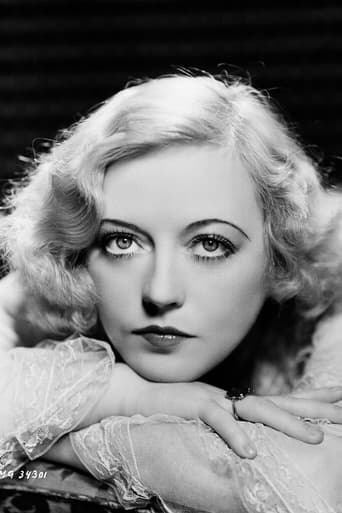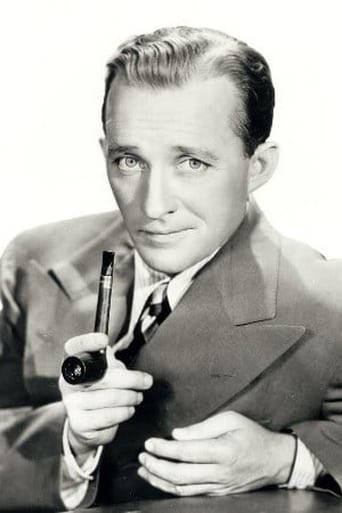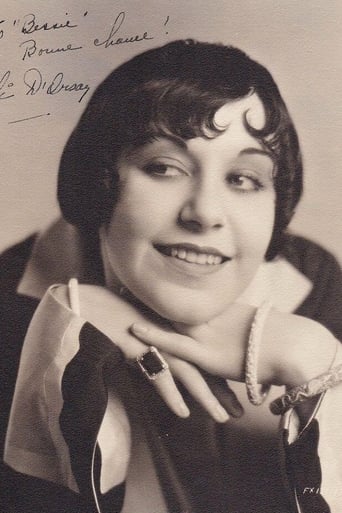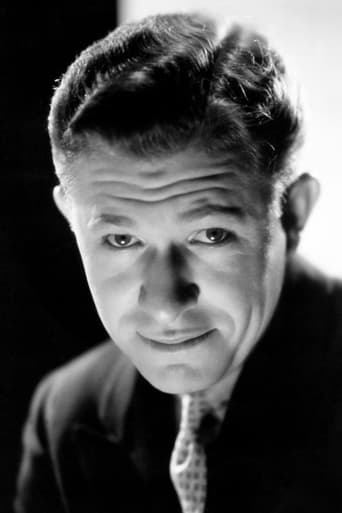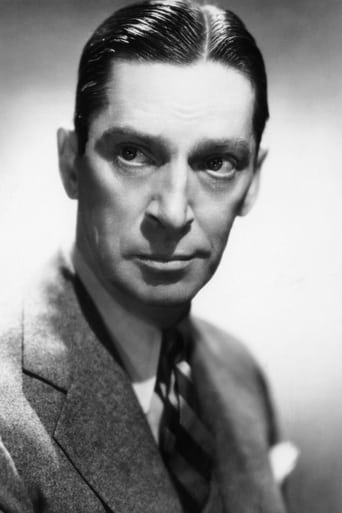Incannerax
What a waste of my time!!!
ThedevilChoose
When a movie has you begging for it to end not even half way through it's pure crap. We've all seen this movie and this characters millions of times, nothing new in it. Don't waste your time.
HottWwjdIam
There is just so much movie here. For some it may be too much. But in the same secretly sarcastic way most telemarketers say the phrase, the title of this one is particularly apt.
Frances Chung
Through painfully honest and emotional moments, the movie becomes irresistibly relatable
Neil Doyle
MARION DAVIES may not have been the inspiration for the lady in Citizen Kane's life, but she sure comes close to making us believe Orson Welles based his story on the Hearst/Davies relationship.As seen here, Miss Davies looks like Joan Crawford with bleached blonde hair and a fixed stare in her starry eyes. She has a big, hearty smile but when it comes to singing, dancing and acting, her talents are scarcely there. She is clunky, to say the least, in her dancing moments and has a voice as smooth as sandpaper when she tries to sing with Bing. As for her acting--well, let me put it this way, three strikes and you're out.As for BING CROSBY, he does very well in this early film, sounding every bit like the classy crooner he was in those days. His talent is evident throughout, overcoming the pedestrian script with his own brand of casual charm. Too bad he had no one with corresponding skills to play opposite. He sounds especially mellow with his rendition of "Temptation" and a couple of other tunes are pleasantly rendered.But let's face it, this is one dated, clunky musical that falls flat in the attempts at laughter even though Patsy Kelly is present to deliver her own brand of humor. Stuart Irwin is wasted in a supporting role as a hapless producer. The less said about Fifi D'Orsay and her French accent the better. She's another triple threat.Highly recommended that you skip this one and catch Bing in one of his better films instead.
blitzebill
Bing Crosby truly was the quintessential vocalist of his time. I strongly recommend Gary Giddins bio on Bing; an excellent reference.Anyway, the story may be weak in this film, but the songs and Bing's clear baritone voice make up for it.An interesting tidbit about this film: Of course Marion Davies was W.R. Hearst's mistress, and Hearst financed the film. Ms. Davies thus took full advantage of the situation by showing up for filming at 10 AM, shooting a scene or two before a four hour lunch replete with all the catered trimmings and wines. The day wound down by 4PM.It's no wonder it took six months to shoot this film in an era when the typical film was shot in 2 weeks!
lugonian
"Going Hollywood" (Metro-Goldwyn-Mayer, 1933), directed by Raoul Walsh, hailed as one of the better Marion Davies productions for MGM during the sound era (1929-1934), is an interesting item mainly because of the presence of her co-star, Bing Crosby (on loan from Paramount), then in an early peak to his career, along with his introduction to the hit song, "Temptation." It also became Marion Davies' second MGM comedy with a Hollywood background, the first being the silent production of "Show People" (1928), which today seems to hold up better than "Going Hollywood," but on the whole, each provides an interesting tale and the behind-the-scenes look to a bygone era.Davies stars as Sylvia Bruce, a young French teacher at Miss Briarcroft's School for girls. Surrounded by prudish middle-aged teachers (including one played by Clara Blandick), she gets herself into trouble for constantly speaking her mind. Her only enjoyment out of life is listening to the pleasant crooning of Bill Williams (Bing Crosby) on the radio. Because she wants music, love and life, and is unable to get it at Briarcroft's, Sylvia quits her job to find her happiness. She then locates Bill Williams at his hotel room to thank him for inspiring her to fulfill her dreams, and because Bill is packing up and on his way to Hollywood by train to appear in an upcoming motion picture, Sylvia decides to pursue him. During the course of the story Sylvia disguises herself as a French maid on the train and darkens herself up as a colored girl on the set for a Civil War movie. But things don't go so well for Sylvia when she keeps encountering Lily Yvonne (Fifi Dorday), a hot tempered French actress who not only happens to be Bill's leading lady, but his fiancée, and thus, getting one face slap too many from her whenever she is seen with Bill. After Sylvia is spotted by Lily doing imitations of her on the set, much to the delight of the production crew, Lily offers her another slap across the face, causing Sylvia to break loose and give Lily a black eye for her trouble. After Lily walks off the set, Sylvia is then given the leading part, but further complications occur, especially misunderstandings that cause Bill to not show up on the set, leading to his termination from production."Going Hollywood" is a typical and lighthearted musical comedy with noteworthy songs by composers Nacio Herb Brown and Arthur including: "Our Big Love Scene," "Beautiful Girl," "Going Hollywood," "Just an Echo in the Valley" (by Reginald Connelly, Jimmy Campbell and Harry Woods); "Going Hollywood," "We'll Make Hay" (all sung by Bing Crosby); "Have You Heard?" (sung by Marion Davies); "Cinderella's Fella" (sung by chorus); "After Sundown," "Temptation" and "Our Big Love Scene." Many songs, no real production numbers, with the exception of a interesting dream sequence to note with the lively "We'll Make Hay" number, as Sylvia is being crooned to by Bill (Crosby) on the farm surrounded by dancing scarecrows and farmhands. (At one moment, Sylvia gets to see herself doing a dance). During all this, the camera super imposes on the sleeping Sylvia with her closed eyes and smiling face. In another memorable moment, Crosby sings his haunting rendition to "Temptation" while sitting on a bar stool to Fifi Dorday, surrounded by black patrons on the dance floor. This "Temptation" number was clipped into one of the musical highlighted segments to THAT's ENTERTAINMENT, PART 2 (1976). The score to "Temptation" would he heard again in future MGM films, as well as "Beautiful Girl." In the supporting cast are Stuart Erwin as Ernest P. Baker, the movie financier; Ned Sparks as Bert Conroy, the movie director; Bobby Watson as Jack Thompson, and in smaller roles, Sam McDaniel, Sterling Holloway and Nora Cecil. The story takes time out for humor with the Radio Rogues as electricians spoofing radio shows and personalities of the day, such as Rudy Vallee and Morton Downey. Patsy Kelly, in her movie debut, provides some added spark with her sassy humor, which makes up for Fifi Dorsay's obnoxious and unpleasant portrayal as the temperamental French star. Kelly would provide laughs in other Davies Davies comedies, including PAGE MISS GLORY (1935) and EVER SINCE EVE (1937), both at Warner Brothers."Going Hollywood" at 77 minutes, is available for viewing on cable television's Turner Classic Movies as well as video cassette. (***)
Ron Oliver
When she discovers that the crooner she adores is GOING HOLLYWOOD, a liberated school teacher dogs his steps all the way to the Studio sound stages.Marion Davies tries her hardest to entertain in this tinsel town spoof, but neither the script (based on a story by the celebrated Frances Marion) nor the direction give her much leeway. Raoul Walsh seems a curious choice to direct this kind of film, but he must have had William Randolph Hearst's approval or he never would have been given the assignment. The trouble is that Marion has little chance to be anything other than sweet & pleasant - when finally given the opportunity to do a wicked spoof of co-star Fifi D'Orsay, she's terrific. Unfortunately, moments like that come all too rarely.Leading man Bing Crosby comes off rather better, showing the casual charm that would make him a huge star. And he gets to sing some fine tunes by Nacio Herb Brown & Arthur Freed, including the classic ‘Temptation' and the fun ‘We'll Make Hay While The Sun Shines.' Although his character is a bit of a cad, Bing never fails to deliver the goods to the audience.A troika of character performers add sparkle to the proceedings: earnest Stuart Erwin as a film producer; caustic Ned Sparks as a dictatorial director; and tomboy Patsy Kelly as a plain-talking gal trying to break into the movies.Movie mavens will spot Clara Blandick & Nora Cecil as two of the ossified instructors at the girls' school, and Sterling Holloway as a recording mike technician - all uncredited.Oddly, this film about the Hollywood movie business takes time out to poke fun at contemporary radio stars. Mimic singers & impressionists, The Radio Rogues will provide a smile to viewers with very long memories.***********************Time has not dealt kindly with Marion Davies. Almost forgotten today, when remembered at all it is usually as a sort of footnote to history or object of scandal. Her life certainly was colorful, and as chatelaine of America's most amazing private estate she did circulate amidst powerful circles. But to remember her as only the bimbo blonde mistress of the country's mightiest media baron is patently unfair.While much of the blame can go to Orson Welles' spoof of Davies in CITIZEN KANE (which he was to admit he regretted towards the end of his life) it must be stated emphatically that Marion was not a no-talent actress with few friends & even fewer brains, whose career was destroyed by her stammer, leaving her to spend lonely years in great, hulking empty castles.In reality, Davies was a bright, vivacious lady who charmed & captivated such diverse guests as George Bernard Shaw & Winston Churchill throughout her 33-year liaison with Hearst. Adored by her friends and a fierce cadre of fans, Davies was renowned for her tireless generosity and charitable good works. Her speech impediment never affected her screen acting and her undeniable talent was evident to any who were willing to assess her performances honesty and look past the scandal.Davies had to have been embarrassed by the Hearst empire's relentless pushing of her career. She knew this left her open to ridicule & mockery, doubtless contributing to her scarcely concealed alcoholism. But she eventually relinquished her film pursuits in order to care for the aging Hearst, and after his death in 1951 she showed herself to be an astute businesswoman during the remaining ten years of her life.It is only now, with the passage of much time & the restoration of her old movies, that it is becoming easier to acknowledge the contributions & cinematic expertise of Miss Marion Davies.
